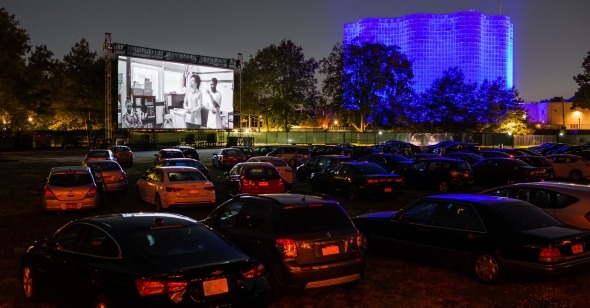Entertainment for your car with the FAR! Catch a movie, crank pop tunes on the radio, take the kids to their obscure sports practices, or watch exclusive and expensive short content (not available after November 1).
Send articles throughout the next week to ploughmanplods [at] gmail! Post articles from the previous week below! Happy Friday!
Nick Pinkerton does a two-part series on the return of drive-in theaters for Reverse Shot, chronicling their shaky early experiments and their sometimes unusual attempts to shoulder the burden of exhibition primacy in the pandemic, (including finally luring him back for a Climax / Salo double-feature):
That the drive-in experience left an indelible impression on generations of moviegoers is testament to the role drive-ins would play in the films some of them would later make: the spaceship barnstorming sequence in Joe Dante’s Explorers (1985), or the crane over the drive-in screen in Quentin Tarantino’s Once Upon a Time… in Hollywood (2019)—the Paramount Drive-In in South L.A., standing in for the Van Nuys Drive-In—the film’s most serenely lovely moment. Those who experienced the steamy passion pits of the sex-and-drugs ’70s may warm themselves for a lifetime in the glow of that nostalgia, but for myself, it is difficult to grow too moony over the memory of watching Deep Impact (1998), sober as a deacon, in a burgundy Mercury Topaz.
The October issue of Senses of Cinema offers over a dozen quick essays on iconic pop tunes in movies for your drive-time listening. Tracks include “California Dreamin'” in Chungking Express, “All These Things that I’ve Done” in Southland Tales, Wang Chung’s title track for To Live and Die in LA :
With its fatalistic lyrics (“I wonder why we waste our lives here / When we could run away to paradise / But I am held in some invisible vice”), the title track is not so much a love theme as a requiem for the casualty rate that ensues in the film. The song makes clear that Los Angeles in the mid-‘80s is a place whose glamour is out of reach for most inhabitants, but addictive all the same.
At Slant, Garrett Bradley talks to about her beautiful and moving doc Time as it becomes available on Amazon Prime, and how to service to the depth of the people she portrays:
Part of the challenge in the edit when looking at it was, wow, this actually feels really two-dimensional. It feels like we have no way of my proving as a filmmaker what I knew, which was the holistic nature of who we are as human beings. We are 360-degree beings. We have context, we have history, we have experience that informs how we maneuver the present moment. How do I show that? That’s ultimately the challenge of making films, you can only tell stories and say things one frame at a time, from one dimension.
The best article on the demise of Quibi is probably a few weeks out but we can’t help but revel in the schadenfreude in the moment. Here’s Julia Alexander at The Verge with 11 ways a company can drive into the ground hard enough to make MoviePass blush:
I can not stress this enough: Quibi didn’t work because no one at Quibi knew what it should be, what people wanted, or how people use their phones. Its entire existence is predicated on the idea that people want high-quality shortform content every single day, but executives arrogantly failed to acknowledge the simple point that people have routinely been getting that, for free, for years. Quibi didn’t fail because TikTok existed; it failed because executives refused to see TikTok as its biggest competition. Instead of learning from the very apps people spend hours on every day, Quibi stuck its nose up and said, “we’re doing something different” — even if no one is particularly interested.
And finally, Ruth S. Barrett at The Atlantic looks into families driven to dominate at niche sports for the sake of an Ivy League scholarship:
Thirty years later, in a twist worthy of a Jordan Peele movie, Fairfield County has come to resemble Compton in the monomaniacal focus on sports. “There’s no more school,” a parent from the town of Darien told me flatly. (She, like Sloane and several other parents, did not want to be identified for privacy and recruitment reasons.) “There’s no more church. No more friends. We gave it all up for squash.”


